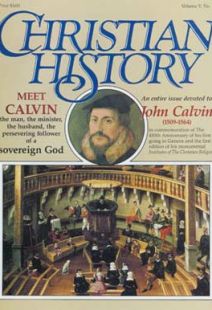From the Archives: To Luther
Calvin was a prolific letter-writer. Reprinted below is the entire text of a letter sent to Martin Luther, by way of Philip Melanchthon; along with some of Calvin’s writings. Melanchthon never showed the letter to Luther.
Philip Melanchthon [1497–1560]
Despite the animosity that later existed between Lutherans and Calvinists, Melanchthon and Calvin were dear friends.
January 21, 1545
To the very excellent pastor of the Christian Church, Dr. M Luther, my much respected father.
When I saw that my French fellow-countrymen, as many of them as had been brought out from the darkness of the Papacy to soundness of the faith, had altered nothing as to their public profession, and that they continued to defile themselves with the sacrilegious worship of the Papists, as if they had never tasted the savour of true doctrine, I was altogether unable to restrain myself from reproving so great sloth and negligence, in the way that I thought it deserved. How, indeed, can this faith, which lies buried in the heart within, do otherwise than break forth in the confession of the faith? What kind of religion can that be, which lies submerged under seeming idolatry? I do not undertake, however, to handle the argument here, because I have done so at large already in two little tractates, wherein, if it shall not be troublesome to you to glance over them, you will more clearly perceive both what I think, and the reasons which have compelled me to form that opinion. By the reading of them, indeed, some of our people, while hitherto they were fast asleep in a false security, having been awakened, have begun to consider what they ought to do. But because it is difficult either casting aside all considerations of self to expose their lives to danger, or having roused the displeasure of mankind to encounter the hatred of the world, or having abandoned their prospects at home in their native land, to enter upon a life of voluntary exile, they are withheld or kept back by these difficulties from coming to a settled determination. They put forth other reasons, however, and those somewhat specious, whereby one may perceive that they only seek to find some sort of pretext or other. In these circumstances, because they hang somehow in suspense, they are desirous to hear your opinion, which as they do deservedly hold in reverence, so it shall serve greatly to confirm them. They have therefore requested me, that I would undertake to send a trusty messenger to you, who might report your answer to us upon this question. And because I thought it was of very great consequence for them to have the benefit of your authority, that they might not fluctuate thus continually, and I myself stood besides in need of it, I was unwilling to refuse what they required. Now, therefore, much respected father in the Lord, I beseech you by Christ, that you will not grudge to take the trouble for their sake and mine, first, that you would peruse the epistle written in their name, and my little books, cursorily and at leisure hours, or that you would request some one to take the trouble of reading, and report the substance of them to you. Lastly, that you would write back your opinion in a few words. Indeed, I am unwilling to give you this trouble in the midst of so many weighty and various employments; but such is your sense of justice, that you cannot suppose me to have done this unless compelled by the necessity of the case; I therefore trust that you will pardon me. Would that I could fly to you, that I might even for a few hours enjoy the happiness of your society, for I would prefer, and it would be far better, not only upon this question, but also about others, to converse personally with yourself; but seeing that it is not granted to us on earth, I hope that shortly it will come to pass in the kingdom of God. Adieu, most renowned sir, most distinguished minister of Christ, and my ever-honoured father. The Lord himself rule and direct you by his own Spirit, that you may persevere even unto the end, for the common benefit and good of his own Church.
By John Calvin
[Christian History originally published this article in Christian History Issue #12 in 1986]
Next articles
From the Archives: Selections from Confessions of Faith
Selections From Confession of Faith which all the citizens and inhabitants of Geneva and the subjects of the country must promise to keep and hold.
Council of GenevaFrom the Archives: On the Advantages of an Inventory of Relics
What got Calvin riled enough to indulge in biting satire?
John Calvin



